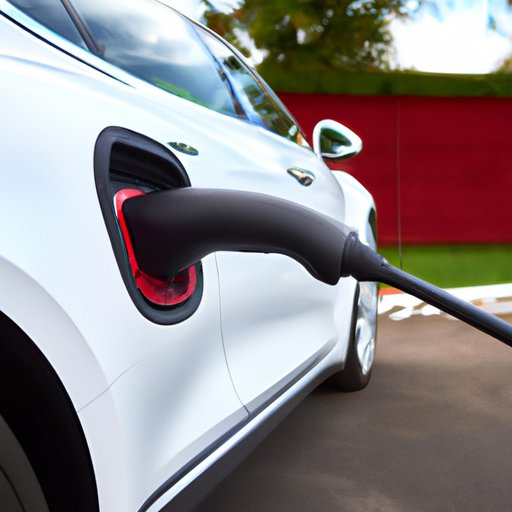Introduction
Electric cars are becoming increasingly popular as people become more aware of the environmental damage caused by traditional gas-powered vehicles. One of the most well-known electric car manufacturers is Tesla, which produces a range of luxury electric vehicles that have revolutionized the automotive industry. But how much does it cost to fill up a Tesla? In this article, we’ll explore the different costs associated with charging a Tesla, from fuel costs to electricity prices.

A Comprehensive Breakdown of Tesla Charging Costs
When it comes to comparing the costs involved in charging a Tesla, it’s important to consider both the fuel costs for traditional cars versus Teslas, as well as the cost of recharging a Tesla battery.
Comparing Fuel Costs for Traditional Cars vs. Teslas
According to the U.S. Energy Information Administration (EIA), the average price of regular gasoline in the United States is $2.64 per gallon. This means that filling up a 15-gallon tank would cost around $39.60. In comparison, electric cars like the Tesla Model 3 require no gasoline and therefore no fuel costs.
The Cost of Recharging a Tesla Battery
The cost of recharging a Tesla battery depends on several factors, including the type of charger used, the amount of electricity consumed, and the local electricity rate. For example, if you use a Level 2 charger at home, you’ll pay the same electricity rate as you would for any other household appliance. If you use a Tesla Supercharger, you’ll be charged a flat fee based on the amount of electricity consumed.
How Much Does it Cost to Recharge a Tesla?
Now that we’ve discussed the fuel costs for traditional cars versus Teslas, let’s take a look at the cost of recharging a Tesla battery. As mentioned above, the cost of recharging a Tesla battery depends on the type of charger used, the amount of electricity consumed, and the local electricity rate. Let’s take a closer look at each of these factors:
Price of Electricity
The price of electricity varies widely depending on where you live. According to the EIA, the average residential electricity rate in the United States is 12.89 cents per kilowatt-hour (kWh). This means that if you use 1 kWh of electricity, you’ll be charged $0.1289.
Cost of Home Charging
If you choose to charge your Tesla at home, you’ll pay the same electricity rate as you would for any other household appliance. For example, if you use a Level 2 charger, you’ll be charged the same rate as you would for running an air conditioner or washing machine. Depending on your local electricity rate, this could add up to several hundred dollars per month.
Cost of Tesla Superchargers
Tesla also offers its own network of Superchargers, which provide fast and convenient charging for Tesla vehicles. The cost of using a Tesla Supercharger varies depending on the amount of electricity consumed, but is generally around $0.26 per kWh. This means that if you use 10 kWh of electricity, you’ll be charged around $2.60.
Analyzing the Financial Implications of Owning a Tesla
In addition to the cost of recharging a Tesla battery, it’s important to consider the total cost of ownership when deciding whether or not to purchase an electric vehicle. While electric cars can be more expensive upfront, they are often cheaper to maintain over time due to their low maintenance requirements. For example, electric cars don’t require oil changes or tune-ups, and their batteries are designed to last for many years.
In addition, electric vehicles may qualify for government incentives and tax credits, which can help offset the initial cost of purchasing a Tesla. For example, the federal government offers a tax credit of up to $7,500 for electric vehicles, and some states offer additional incentives.

Exploring the Benefits of Tesla Charging Stations
Finally, it’s important to consider the convenience and speed of Tesla charging stations. Tesla’s Supercharger network provides fast and convenient charging for Tesla vehicles, and there are now over 14,000 Tesla charging stations located across the United States. This makes it easy for Tesla owners to find a place to charge their vehicles, no matter where they are.
Conclusion
Charging a Tesla can be more expensive than filling up a traditional gas-powered vehicle, but the costs involved depend on several factors, such as the type of charger used, the amount of electricity consumed, and the local electricity rate. Additionally, electric vehicles may be cheaper to maintain over time due to their low maintenance requirements and may qualify for government incentives and tax credits. Finally, Tesla’s Supercharger network provides fast and convenient charging for Tesla vehicles, making it easy for Tesla owners to find a place to charge their vehicles.
Overall, while the costs associated with charging a Tesla can be significant, the benefits of owning an electric car—including lower fuel costs, reduced maintenance costs, and tax credits—can make them a worthwhile investment.
(Note: Is this article not meeting your expectations? Do you have knowledge or insights to share? Unlock new opportunities and expand your reach by joining our authors team. Click Registration to join us and share your expertise with our readers.)
